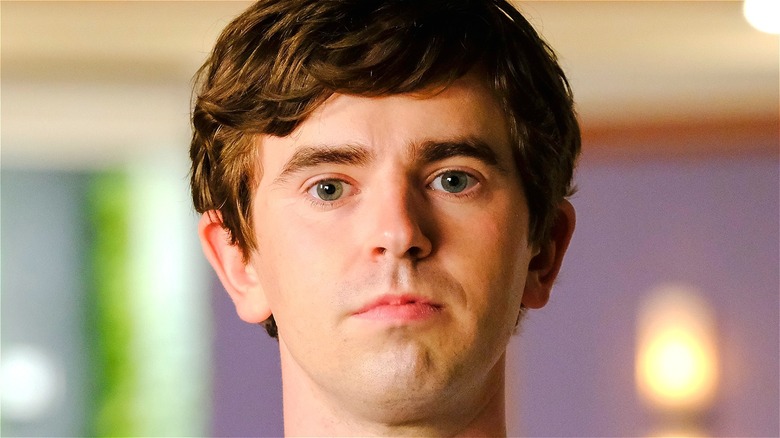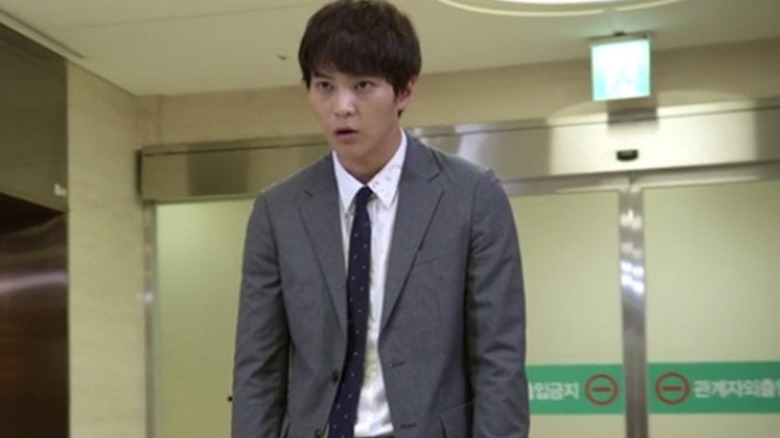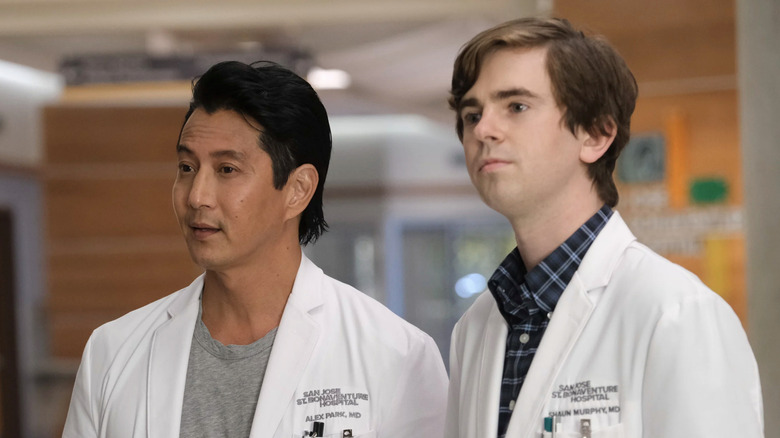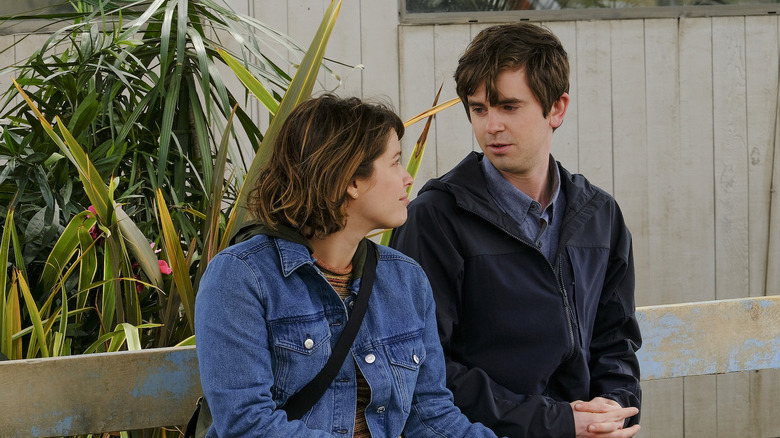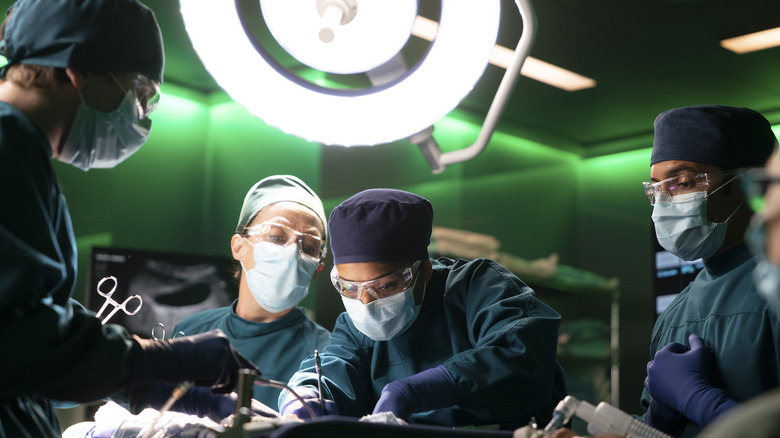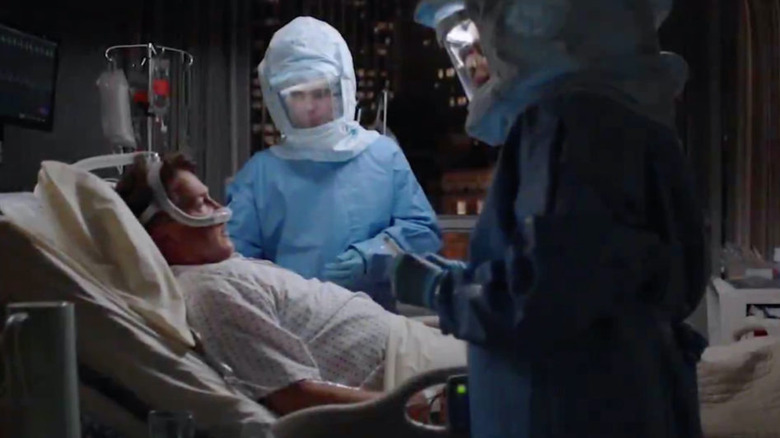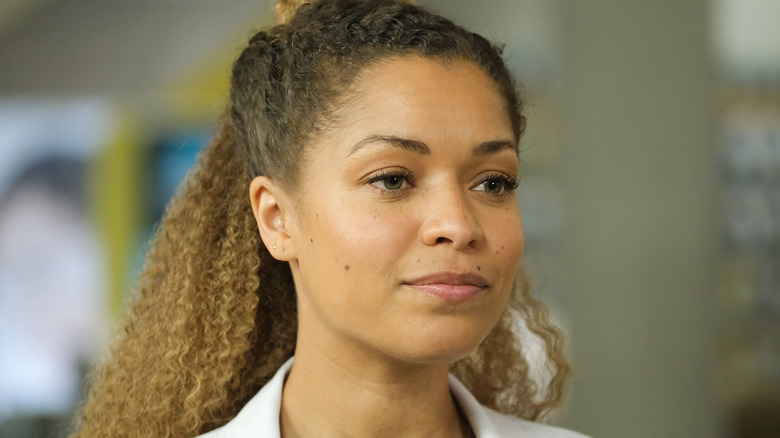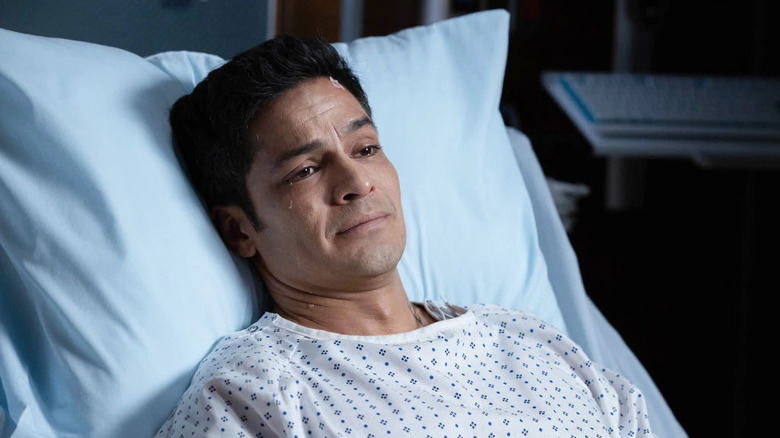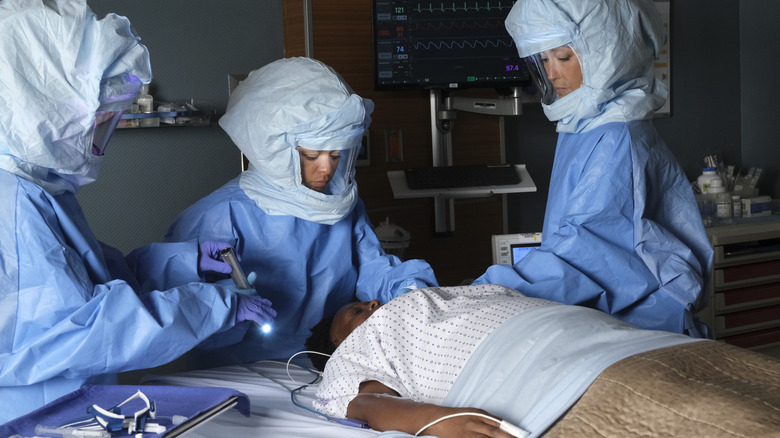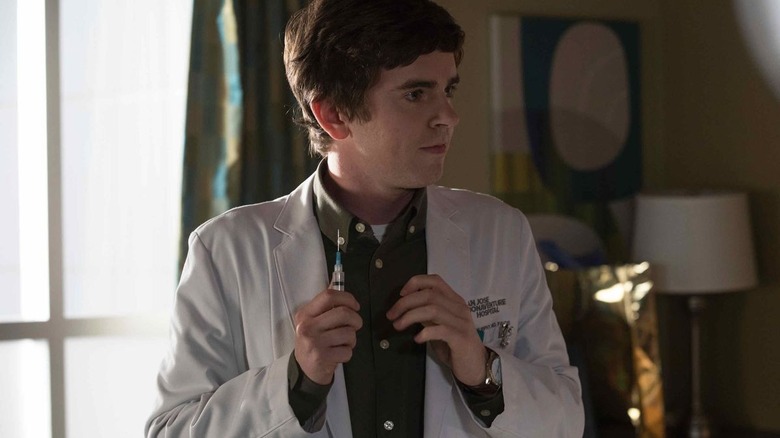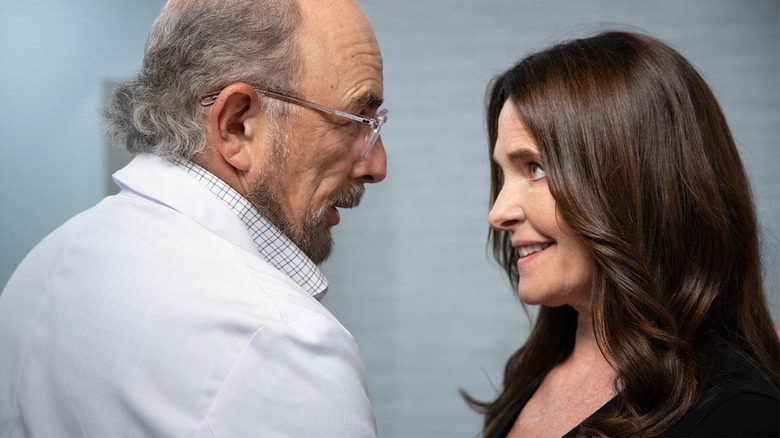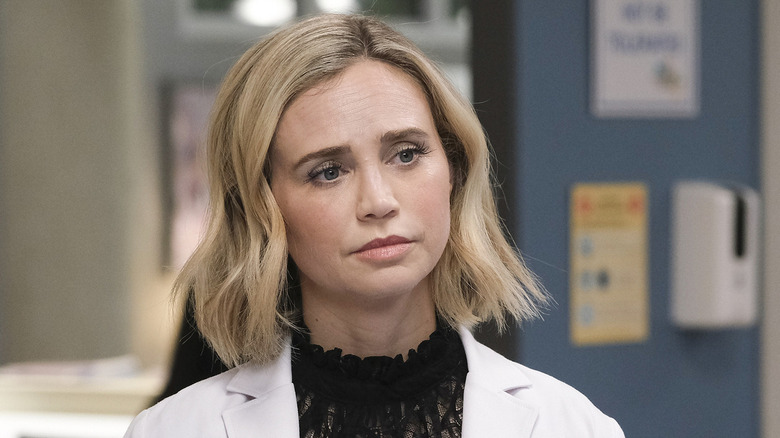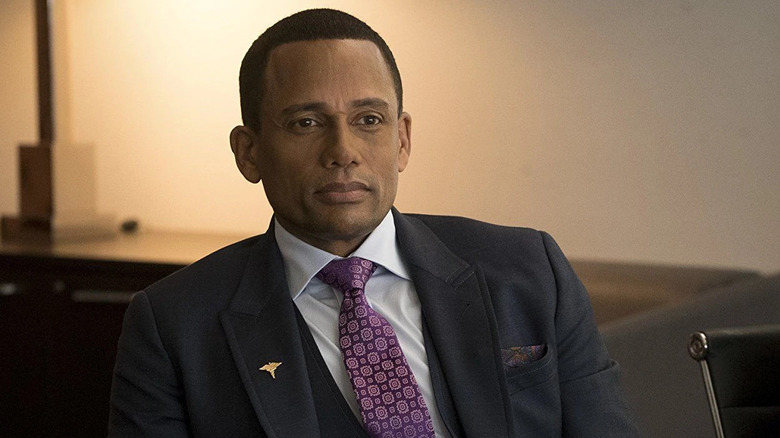The Untold Truth Of The Good Doctor
First debuting on ABC's fall schedule in 2017, "The Good Doctor" stars Freddie Highmore as Dr. Shaun Murphy, a young surgeon whose perspective transforms the people around him.
An autistic man with savant syndrome, Shaun is a surgical resident at San Jose St. Bonaventure Hospital. His gift for photographic recall and understanding of anatomy make him a natural fit for medicine. However, Shaun's neurodivergence makes some colleagues like Dr. Melendez (Nicholas Gonzalez) doubt his gifts. Allies like his mentor, Dr. Glassman (Richard Schiff), and Dr. Claire Browne (Antonia Thomas) aid Shaun, but the young doctor ultimately has to prove for himself that he has what it takes to be a professional surgeon.
Over the course of several seasons, Shaun goes through a great deal of turmoil, but he also opens up his life to others, including agreeing to marry his girlfriend Lea (Paige Spara). Showrunner David Shore said in an interview with Deadline that he sees Shaun's experiences, regardless of his differences, as universal: "I think this series is about finding new opportunities and new challenges for him, and seeing that those challenges are the same that we all experience."
As the show, now in Season 5, gets closer to airing 100 episodes, we'll take a look at actor Daniel Dae-Kim's hand in producing the show, the original South Korean version, how the visual effects work, and much more. This is the untold truth of "The Good Doctor."
The Good Doctor was originally a South Korean drama series
The series is in fact a remake of a South Korean TV show simply titled "Good Doctor." Both shows have similar first episodes before they diverge into very different narratives. In the Korean series, actor Joo Won plays Park Si-on, who, like his American counterpart, is an autistic savant working as a surgeon. "Good Doctor" originally ran 20 episodes in 2013 to strong ratings (via Tenasia).
In 2014, "Lost" and "Hawaii Five-0" star Daniel Dae Kim bought the rights to remake "Good Doctor" overseas through his production company 3AD. According to The Hollywood Reporter, Dae Kim's motivation was in part to translate the unique feeling of Korean television to American audiences, because as Kim commented, "in America, there are more serialized dramas and there can be room for something inspired by Korean TV...I believe good content can transcend cultural barriers." "Good Doctor" being a medical drama — much like successful shows like "Grey's Anatomy" or "ER"— also influenced the decision as well.
ABC later agreed to air the series with Kim serving as a producer and "House" creator David Shore hired as the showrunner (via Deadline). Shore's approach was not to "Americanize" the series but make something original: "I think we're just going, 'That's a great story. I would like to tell that story and make it my own.' And that's what happened here" (via TV Guide).
Paige Spara auditioned from a bathroom to land the part of Lea
Fresh off the "Psycho" drama "Bates Motel," actor Freddie Highmore appears to have been the first choice to play Shaun Murphy. Highmore originally turned the part down because he wasn't sure about leading another show so soon after "Bates Motel" (via Adweek). It's lucky that he changed his mind then, as he became the star of a highly-rated network drama with a Golden Globe nomination for Best Actor (via IMDb).
Antonia Thomas' casting as Dr. Claire Browne was actually announced first, shortly before Highmore signed on alongside Nicholas Gonzalez (via Deadline). According to Town & Country Magazine, she was attracted to the role of Claire primarily because "she's a ball of contradictions in that she's very smart and driven and has a huge heart, but...quite quickly she makes some very big mistakes."
Paige Spara, who plays Shaun's eventual girlfriend and fiance Lea, was meant to be a guest star but soon became a regular character on the series. This was despite having to record an audition for the show from her parent's bathroom. Spara also had no steady Internet connection, and no access to a computer or printer, not to mention poor lighting, but she landed the role anyway. She'd later attribute the success to her mother's patience and help: "I appreciated my mom so much that day...[with her help] I was able to be calm and collected and it helped me find who Lea was" (via The Blast).
The Good Doctor's depiction of autism has been criticized
David Shore did heavy research into Autism Spectrum Disorder (ASD) before writing "The Good Doctor," telling a TCA panel that "we [the writers] saw a lot of doctors, we consulted with people, we've got people on the spectrum who we're working with" (via Deadline).
Nevertheless, the medical drama has been criticized by professionals as well as neurodivergent writers for, like other popular media such as "Rain Man," depicting ASD characters as primarily "awkward white male geniuses" as well as interpreting Shaun's differences and challenges as a superpower. Three experts wrote in an op-ed for The Hollywood Reporter that the series "creates a mythical autistic superhero who deceives the public by misrepresenting how disabling autism can be in this society."
An actual autistic doctor wrote that they liked the show but noted how many autistics have extreme empathy, not a disconnect from others as the series suggests, and wished it also depicted more of the range of behaviors in Autism Spectrum Disorder (via The Conversation). For Slate, autistic writer Sara Luterman also praised Shaun's humanity as a disabled character "even if it frequently seems to be by accident" on the part of the neurotypical creative team.
Ultimately, the series has received positive reception as well as sharp criticism from the autistic community.
You can thank MastersFX for the graphic surgery scenes
"The Good Doctor," like other medical dramas, isn't always accurate about actual hospital procedures, but it has to depict surgeries and gruesome injuries in a realistic way or it wouldn't feel believable. This is where visual effects company MastersFX comes in.
MastersFX works on the bodies shown during surgeries, intending to make the procedures look as real as possible. Artist Lori Sandnes told VFX Voice that "if the actors need to be dissecting, cutting or suturing something in the body, we want to make it easy for them to be able to perform the action as close as possible to the script." The team also works with the show's medical consultants as well as uses clips of actual surgeries for reference points.
The prosthetics and practical effects involved can include hearts, body casts, facial injuries, and even fake marlins. The most important thing for MastersFX founder Todd Masters though is "helping to create an organic, relatable character in service to the story –- [this] is always paramount" (via VFX Voice).
The Good Doctor is fairly medically accurate
In terms of medical accuracy and realistic depictions of hospital life, TV has always received mixed reviews from actual doctors. The hookups and egregious errors by interns and residents on "Grey's Anatomy" are considered extremely unrealistic by the medical community. "Scrubs" meanwhile has always been regarded as highly accurate and very aware of working dynamics in a hospital (via TV Insider).
"The Good Doctor" has some errors but is more realistic than many other medical TV shows. In an interview with TV Insider, the show's medical consultant Dr. Oren Gottfried discusses how he suggests actual medical incidents from real life to the writers. The doctor noted that "Some [cases] do seem so outlandish, but the fact is they're really medical truth."
Experts praised the drama in one article about medicine on television as "more accurate than other shows in terms of medical terminology, diagnoses, and treatments" but criticized small errors in depicting protocol and basic procedures (via Insider). Professional nurse and actor Rebecca Brown, who often appears on the show, said in an Instagram Live chat that "there are things we sometimes have to tweak but the steps that we're doing that the viewers are watching are correct" (via Country Living).
You can watch all five seasons of "The Good Doctor" currently streaming on Hulu.
Antonia Thomas was ready to say goodbye
Sure, it's sad to see our favorite actors leave, but it's understandable that playing the same character for 20-plus episodes year after year might lead someone to seek new opportunities. Antonia Thomas played the fan-favorite character Dr. Claire Browne since the beginning, but Thomas decided to leave "The Good Doctor" after the Season 4 finale, telling Deadline that her co-stars were nothing but supportive and specifically cited Highmore's encouragement as she sought out new ventures: "It's deeply sad to say goodbye, especially having all been together for four years, but I think, ultimately, they all understand that you have to follow your creative needs and wanting to try some different things."
However, Thomas doesn't want to say goodbye to Claire forever. She noted that she's completely on board with returning to the show when it makes sense for the story. In fact, she already made good on her promise during Shaun and Leah's wedding. Of course, it's a lot easier to say goodbye when it isn't final. One thing that separates TV from films is the heavy workload and near-constant filming. Actors are able to take on multiple movies at once, but Thomas noted that the inability to embark on other projects during filming contributed to her decision: "Really, for me, if there was more time in the year to be able to shoot the show and to be able to go off and do some of the other things that I'm wanting to explore now, I'd do both."
Nicholas Gonzalez was bummed by his character's death
Sometimes, a story takes characters on a specific journey that bums out the actor just as much as the fans. "The Good Doctor" frequently confronts mortality with the doctors' patients, however, we didn't get much of that energy regarding the doctors prior to the earthquake storyline explored at the end of Season 3 — which is the main reason that writers chose to kill off Nicholas Gonzalez' Dr. Neil Melendez.
Creator David Shore apparently didn't want to get into it during an interview Deadline in 2020, saying, "None of it is personal. You know, Nick was fantastic, and there's nothing I can say to you that will make you go, 'Oh, yeah. Okay. It had to be that way.'" After noting that they had to kill off someone the audience adored, he added, "New characters are going to come, old characters are going to leave, and we feel the pain when they leave, and we feel excitement when they come."
While Gonzalez knew about his character's fate well before fans, he only found out late in the third season. He confirmed to Entertainment Weekly: "Part of me is sad to see a character I respected a lot go — someone I felt that still had a lot more to say — but there wasn't always that opportunity, and I feel like we really built a beautiful world around that character, as much as can be in a show like ours where we're still a procedural as well." The actor compared his last day on set to "saying goodbye to something that felt like home." Ouch.
Freddie Highmore wanted to honor service workers during COVID storylines
Plenty of shows ignored the pandemic when filming resumed, yet medical procedurals offered Hollywood the perfect opportunity to tackle COVID-19 and the conditions healthcare workers faced. Freddie Highmore told ABC, "We would've been doing them [first responders] a huge disservice to somehow ignore the realities of our time and choose not to focus on that." Like all Hollywood sets, "The Good Doctor" cast and crew had strict guidelines for filming, but Highmore noted that it added another level of understanding while playing these characters: "There are challenges, and there are differences, but it just puts into perspective what real-life doctors are having to do."
Because the series isn't sex-heavy, Highmore noted that the filming restrictions didn't change too much in terms of how the characters engage with each other. And though everyone involved wanted to honor the plight of healthcare workers, they were also intent on keeping things hopeful for fans watching at home, as Highmore explained.
Creator David Shore Entertainment Weekly that he had to remain moderately detached while writing the pandemic storylines, but that they affected him more upon watching the final product. On how they approached the medical components, Shore said, "We tried to avoid stuff that might change day-to-day, but yes, there was a fear of that." He also noted the real-life relevance of having a doctor say that a symptom isn't related to COVID, only for that to be proven untrue later — because that's what happened with real doctors during the first waves.
Freddie Highmore can't do CPR
Dr. Shaun Murphy may declare that he's a surgeon on more than a few occasions, but Freddie Highmore isn't interested in following in his character's footsteps — even for simple emergencies. After playing a doctor on TV for years, it would be easy to forget, even for a moment, that you don't have actual training. But Highmore is hyper-aware of the fictional components of his on-screen doctorate.
Jimmy Kimmel asked if Highmore could see himself as a doctor, to which the actor responded, "I think the more I do the show, the more dangerous it would be for me to try to do surgery, because I have this fake accumulated knowledge that when someone's like, 'Oh, could you fix my gallbladder,' I'd think, 'Oh yeah, it's just like a two-minute surgery." He added, "So I stay away. I have to refrain myself from claiming to be a doctor."
Not only can Highmore not fix your gallbladder, but it wouldn't be wise to ask his assistance for a medical emergency on a plane, either. He told Kimmel that he doesn't even know how to do CPR and joked, "First aid is still ... I'm working on it. I just went straight to surgery. You don't need to know the basics." Well, if there was ever a time for the time-honored cliche, 'Kids, don't try this at home,' this would be it.
Richard Schiff and Sheila Kelley are married IRL
Meet-cutes aren't just relegated to the small screen. Love is in the air for Richard Schiff, and it's not just his character Dr. Glassman. Fans watched Glassy fall in love with Sheila Kelley's character Debbie Wexler in Season 3 of the show, but what they may not know is that Schiff and Kelley are actually married in real life as well. Schiff joked at PaleyFest that he "lobbied to get her the job." "No, [it was] David's idea, actually, and [he] said, [...] 'How do you feel about Sheila coming up to Vancouver as if it would be like a problem [..] like you didn't really know what goes on in the household." Schiff continued, "I could not be more in love and in awe of my wife. [...] But [we were] a little bit nervous [because] we don't get to act with each other very often."
Schiff noted that they played exes on "NCIS" and starred together in "a little movie called 'Santa Fe' many years ago." On the concept of flirting with his wife on set in front of everyone, he said that Kelley was "ecstatic and giddy" to do these scenes. Schiff gushed about working with his wife, saying he "enjoyed every second of her being up there with me." He also cheekily noted that Kelley balanced out his "acerbic nature on set." Luckily, Schiff and Kelley are more successful in the marriage department than their now-divorced characters, as the real couple has been married since 1996. Take notes, Glassy.
Fiona Gubelmann was almost a good doctor
While Freddie Highmore isn't picking up a scalpal in real life any time soon, Fiona Gubelmann (Dr. Morgan Reznick) was on her way to becoming an actual doctor before switching career paths. Though Gubelmann was interested in acting from pre-school, Hollywood wasn't always at the top of her career list. The actor told Collider, "I went to UCLA as pre-med. When I was there my freshman year, I auditioned for a play and got it, and I was so passionate. I just loved acting so much that I decided to switch majors and pursue acting."
She explained that because she was young and didn't have a family, college was the chance to dive deep into her dreams even though being an actor isn't always a stable career choice — especially in the early years of pursuit. Given that she was only pre-med for a portion of her freshman year, it's unclear just how much, if any, that experience has helped her during "The Good Doctor." Yet given how ambitious and cutthroat Dr. Reznick can be, it's certainly possible that intense vibes informed some of that energy during her pre-med stint at UCLA.
Hill Harper comes from a medical family
Fiona Gubelmann isn't the only "The Good Doctor" actor with some pre-show experience in the medical field. Dr. Marcus Andrews actor, Hill Harper, spoke to ABC on the medical aspects of the show and the care that the writers put into every piece of the procedural puzzle. He noted, "Both [of] my parents were physicians. They met in medical school, so I have a great deal of respect for the medical profession."
Having deep family ties to the kind of character he plays is no doubt helpful in understanding the weight that doctors hold every time they pick up a scalpal or decide which cases to take. Hill added, "I have a great deal of respect for the fact that we get to play people that I consider to be heroes in this world, people who are literally on the front lines saving lives."
With that in mind, Hill continued to praise the writers "for doing a great job of making the professional heroes — the doctors — look great, but at the same time, also really interesting stories and stories to tell that kind of connect back to people's personal lives." Given that Hill's character has taken on a hefty leadership role, knowing the ins and outs of the medical profession was no doubt an asset.
